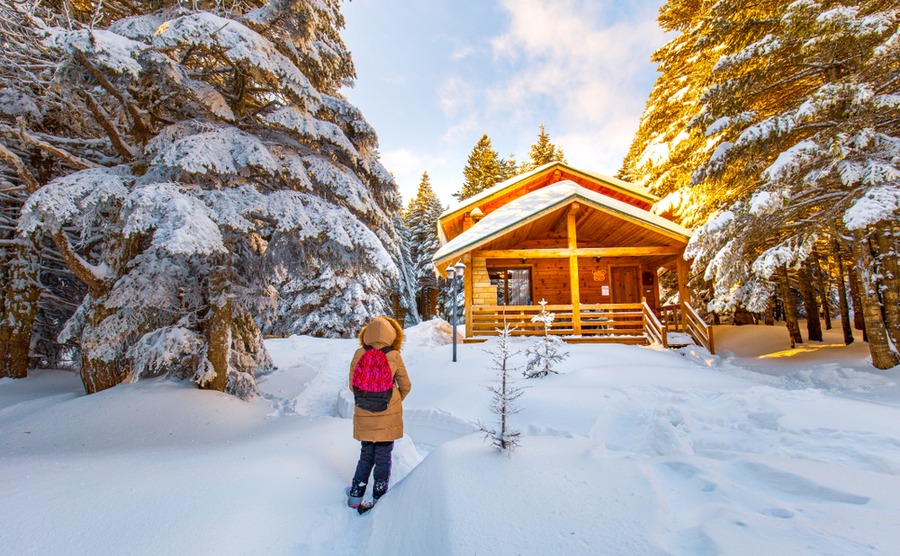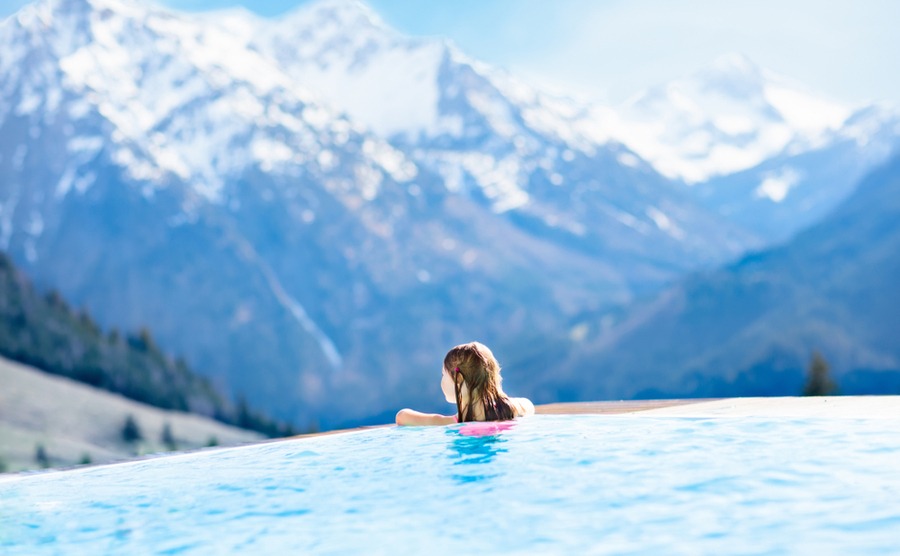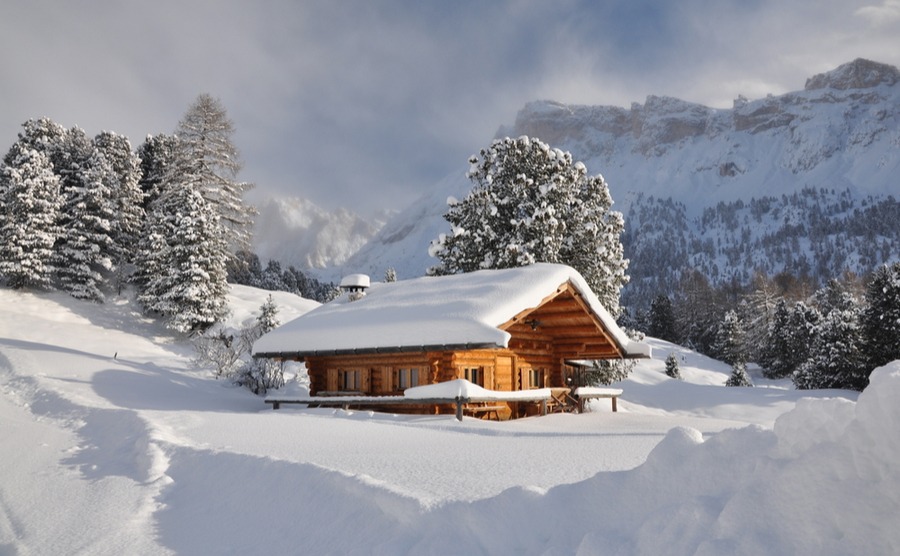Even the most enthusiastic ski bum can’t spend every week on the slopes (unfortunately!). And what a waste to have your mountain home unoccupied when there’s snow outside – in financial as well as skiing terms. So this week we’re looking at how to select a ski property that will maximise your rental returns.
The snow has come thick and fast in Europe recently. Nicely timed for the February half-term and the start of the busiest period of the ski season. It’s good news for anyone who rents out their ski home too. If you’re heading out to the slopes and thinking of investing in a ski property to let, here are ten key things to consider.
Go high
Few of us want to pay out for a ski holiday property that only has a 50:50 chance of snow. As a rule, the higher the resort the more reliable the snowfall and longer the ski season. You can feasibly rent the property out from November to May. For a proven snow record and higher occupancy levels, choose a resort with slopes over 2,000 metres. Access to a glacier is another way to guarantee skiing, often year-round. A high number of snow cannons is another plus.
Even easier than finding new clients each year, is enticing the same ones back year after year
Serious skiers will be looking out for all these things when booking their ski holiday. If you can’t afford to buy in Courchevel 1850, you need to be able to demonstrate that reaching those higher slopes will be relatively easy.

A home anyone would want to rent!
Pistes be with you!
An equal choice of pistes for all levels will certainly widen your appeal. Look for blue, red and black runs, as well as nursery slopes for children and complete beginners. This makes it especially suitable for families. A ski school and crèche for little ones are a must if you’re serious about letting to families.
But just as importantly as getting new clients each year, is enticing the same ones back – it’s a real saving on marketing expenses if guests rebook each year. A resort that forms part of a larger ski area, such as Les Trois Vallees, will keep guests entertained for many years. Guests will have the choice of paying for a pass to ski locally, or paying more and upgrading to a pass that includes the other linked resorts. People like choice!
People are going on holiday, so you’ll have more interest in your property if your resort has plenty to do as night falls
A slightly riskier investment strategy is to appeal to specialist skiers. For example, if the pistes are limited but the off-piste skiing superb, can you find a way of advertising to these more specialised and expert skiers?
Think about the lifts too. How modern are they? Are any improvements or new links planned in the future?
Anyone for après-ski?
People are going on holiday, so you’ll have more interest in your property if your resort has plenty to do as night falls (which is does earlier in winter, of course). That will include restaurants and bars, but also cinemas and interesting shopping. Associated leisure activities such as ice-skating and a spa will also draw in the business. Not everyone enjoys skiing – or any variation of sliding – so are there nearby cities with cultural attractions? You can highlight all these in your marketing, and they’re invaluable for summer rentals too.
A ski property is ideal for sharing with other members of the family. But how do the legalities work, and how do you all get along! Read our guide to buying with family and friends
Transfer – keep it tight
Ideally, your home will be within an evening’s travel time. That way you can leave the office after work or school, enjoy a fondue for dinner and be skiing first thing next morning! Many ski resorts in Europe are just two hours from the UK. But you need to consider transfer times to the nearest airport(s) too, as well as frequency and cost of flights. This is vital if you want to promote your property as a long weekend destination. Most skiers expect to travel up to two hours after touching down, while a transfer of just an hour is a huge bonus.
The option of being able to travel there by train or car (using the ferry/Eurotunnel) is an added selling point. We’re very lucky to have ski slopes even closer than the Mediterranean, so do promote this.
Dual season
For maximum rental potential, pick a resort that’s open for business in the summer as well as the winter season. The mountains can be just as fun in the warmer weather once the snow has gone. Resorts these days offer a range of activities for active outdoorsy types, including trekking, cycling and mountain-biking, rafting, canyoning, para-gliding… Many have built golf and tennis facilities and if there’s a lake nearby there’s even more to do.

Whatever the season, a pool will keep the kids happy
Ski-in ski-out
The magic words for many skiers are “ski in, ski out”, with no need to lug your stuff onto a bus! So don’t just be picky about the resort you buy in, but also about the exact location of your property within the resort. Ski-in ski-out properties near a lift are most sought-after and always let easily. Likewise, the most popular properties are a short walk from the resort centre, with its amenities and shops, and any other leisure facilities.
Upkeep and management
Check what your running costs will be, including utilities, service charges or management fees and council tax. You’ll need insurance too, remembering that your policy includes cover for holiday lets and any associated liability. Most owners use a rental agency to let and manage their property, taking the hassle out of finding guests and handling change-overs. Find out what you should expect to pay in fees for using an agency.
Worried about Brexit? Don’t be. Property ownership and visiting your holiday home won’t be affected even by no deal. Read our brief guide.
Why not look at leaseback?
Really only offered in the French Alps, leaseback is a type of contract that offers a hands-off way of owning a ski property and receiving a fixed annual income from it. Buying this way means you lease your property back to a tourism management company, who takes over full management of it and lets it to ski holiday firms. As the owner, you receive guaranteed rental return and an agreed amount of personal usage each year.
By comparison, the fixed rent you receive from leaseback is less than if you were to buy a classic freehold ski home and let it yourself or through a local agency. Note too, leaseback properties, which are bought off-plan or key-ready, are exempt of VAT.

Ski in, ski out. But make sure there’s a shovel handy!
Could a mortgage make sense?
Cheap mortgage deals in Europe could help you counteract the effects of the weak pound and in the long-term potentially save you money on the purchase of your ski home. Historically low interest rates in the Eurozone combined with negligible – often non-existent – redemption penalties mean it could be financially worthwhile getting a mortgage when buying in the French, Italian or Austrian Alps. Getting a euro mortgage and paying just a deposit in euros, rather than having to transfer the full price from Sterling into euros, would minimise your exposure to today’s poor exchange rate. At a later, if Sterling strengthens, paying back you euro loan will be cheaper. Speak to Smart Currency Exchange for guidance on exchange rates and planning currency transfers.
Take care with tax
When estimating your net income from rentals, remember that you will be liable for income tax locally on your net rental income, after deduction of the allowances applied under the relevant tax regime. You should also declare your rental income to the HMRC in the UK. However, so long as there is a double taxation between the country of your ski home and the UK, you won’t pay income tax twice, only any difference.

